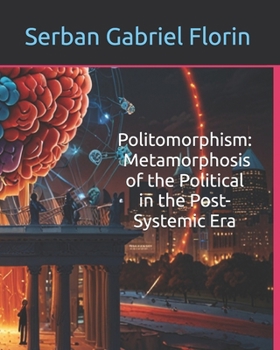Politomorphism: The Metamorphosis of the Political in the Post-Systemic Era
In an era of unprecedented flux-where traditional institutions falter, digital realms reshape collective consciousness, and crises of legitimacy ripple across societies-the frameworks of classical political science are increasingly inadequate.
The rigid structures of the nation-state, fixed ideologies, and institutional power struggle to explain the emergent, fluid, and adaptive forms of governance that define the 21st century.
From the decentralized dynamics of the 2019-2020 Hong Kong protests to the potential rise of blockchain-based digital cities in the near future, the political landscape is undergoing a profound metamorphosis.
To navigate this post-systemic era, we need a paradigm that embraces complexity, harnesses computational power, and redefines the political as a dynamic interplay of consciousness, symbols, and algorithms.
This book introduces Politomorphism, a revolutionary metacognitive and computational framework that offers a universal language for understanding and shaping the future of governance.
Politomorphism reimagines the political not as a static system but as a process of continuous transformation-a system of metamorphoses driven by the interplay of human consciousness, symbolic environments, and algorithmic processes.
Unlike classical paradigms that anchor politics in the nation-state or fixed ideologies, Politomorphism models political systems as networks of epistemological tensions, where legitimacy emerges not from votes but from cognitive and affective resonance.
At its core lies the Politomorphism Engine, a modular computational model with five key functions: Metapolitical Calibration (MC), aligning discourses with the digital noosphere; Cognitive Morphogenesis (CMG), tracing the evolution of political consciousness; Symbolic Resonance Mapping (SRM), charting the acceptance or rejection of symbols; Entropic Equilibrium Function (EEF), measuring political instability; and Legitimacy Dynamics Engine (LDE), simulating cycles of authority and crisis.
These functions process semantic and affective inputs-discourses, memes, collective sentiments-and generate politomorphic outputs: unstable, emergent forms of governance, legitimation, and resistance.
This paradigm is not a theoretical abstraction; it is a scientifically grounded response to the limitations of traditional political science.
Rooted in ontology, semiotics, dynamic systems theory, and informatics, Politomorphism offers a coherent, testable, and predictive framework.
It can analyze real-world phenomena, such as the symbolic and memetic dynamics of the Hong Kong protests, where digital platforms amplified collective resistance, or model future scenarios, like a blockchain-based digital city where decentralized governance redefines legitimacy.
Its computational approach aligns with data-driven social science, while its transdisciplinary nature bridges cognitive science, thermodynamics, and complexity theory, making it adaptable to any cultural or technological context.
For scholars, it offers a rigorous framework to model complex systems; for policymakers, predictive tools to anticipate crises; for technologists, a computational engine to simulate governance; and for all readers, a vision of politics as a dynamic, emergent process.
As we stand at the threshold of a post-systemic era, Politomorphism invites us to embrace the metamorphosis of politics, forging a path toward a future where governance is as fluid, adaptive, and resilient as the world it seeks to shape.A system without transductive reflexivity may persist, but it cannot regenerate Only by re-writing its own code through the grammar of transformation does a polity become truly alive.
The rigid structures of the nation-state, fixed ideologies, and institutional power struggle to explain the emergent, fluid, and adaptive forms of governance that define the 21st century.
From the decentralized dynamics of the 2019-2020 Hong Kong protests to the potential rise of blockchain-based digital cities in the near future, the political landscape is undergoing a profound metamorphosis.
To navigate this post-systemic era, we need a paradigm that embraces complexity, harnesses computational power, and redefines the political as a dynamic interplay of consciousness, symbols, and algorithms.
This book introduces Politomorphism, a revolutionary metacognitive and computational framework that offers a universal language for understanding and shaping the future of governance.
Politomorphism reimagines the political not as a static system but as a process of continuous transformation-a system of metamorphoses driven by the interplay of human consciousness, symbolic environments, and algorithmic processes.
Unlike classical paradigms that anchor politics in the nation-state or fixed ideologies, Politomorphism models political systems as networks of epistemological tensions, where legitimacy emerges not from votes but from cognitive and affective resonance.
At its core lies the Politomorphism Engine, a modular computational model with five key functions: Metapolitical Calibration (MC), aligning discourses with the digital noosphere; Cognitive Morphogenesis (CMG), tracing the evolution of political consciousness; Symbolic Resonance Mapping (SRM), charting the acceptance or rejection of symbols; Entropic Equilibrium Function (EEF), measuring political instability; and Legitimacy Dynamics Engine (LDE), simulating cycles of authority and crisis.
These functions process semantic and affective inputs-discourses, memes, collective sentiments-and generate politomorphic outputs: unstable, emergent forms of governance, legitimation, and resistance.
This paradigm is not a theoretical abstraction; it is a scientifically grounded response to the limitations of traditional political science.
Rooted in ontology, semiotics, dynamic systems theory, and informatics, Politomorphism offers a coherent, testable, and predictive framework.
It can analyze real-world phenomena, such as the symbolic and memetic dynamics of the Hong Kong protests, where digital platforms amplified collective resistance, or model future scenarios, like a blockchain-based digital city where decentralized governance redefines legitimacy.
Its computational approach aligns with data-driven social science, while its transdisciplinary nature bridges cognitive science, thermodynamics, and complexity theory, making it adaptable to any cultural or technological context.
For scholars, it offers a rigorous framework to model complex systems; for policymakers, predictive tools to anticipate crises; for technologists, a computational engine to simulate governance; and for all readers, a vision of politics as a dynamic, emergent process.
As we stand at the threshold of a post-systemic era, Politomorphism invites us to embrace the metamorphosis of politics, forging a path toward a future where governance is as fluid, adaptive, and resilient as the world it seeks to shape.A system without transductive reflexivity may persist, but it cannot regenerate Only by re-writing its own code through the grammar of transformation does a polity become truly alive.
Format:Paperback
Language:English
ISBN:B0FHPQGV51
ISBN13:9798290386546
Release Date:July 2025
Publisher:Independently Published
Length:444 Pages
Weight:1.93 lbs.
Dimensions:0.9" x 8.0" x 10.0"
Customer Reviews
0 rating





